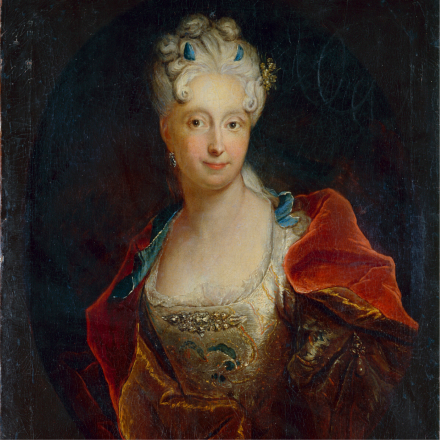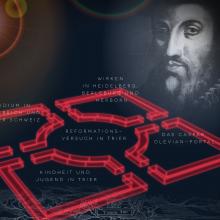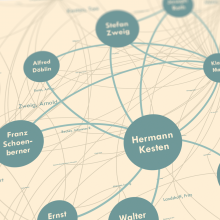“All of Vienna was laughing at me”
amily and Court Relations in the Memoirs of Countess Luise Charlotte von Schwerin (1684-1732)

Project Management: Dr. Ines Peper (Österreichische Akademie der Wissenschaften, Österreich) · Dr. Michael Pölzl (Österreichische Akademie der Wissenschaften, Österreich) · Österreichische Akademie der Wissenschaften, Österreich · Selina Galka (Institut Zentrum für Informationsmodellierung - Austrian Centre for Digital Humanities) · Institut Zentrum für Informationsmodellierung - Austrian Centre for Digital Humanities
Project Participants: Dr Joëlle Weis · Universität Trier - Trier Center for Digital Humanities (TCDH)
Sponsors: FWF Der Wissenschaftsfonds
Running time: -
Contact person (TCDH): Dr Joëlle Weis
References:
Maurice Dumas, Claudia Ulbrich (Hgg.), unter Mitarbeit von Sebastian Kühn, Nina Mönich und Ines Peper: Une conversion au XVIIIe siècle. Mémoires de la comtesse de Schwerin, Pessac 2013.
Claudia Ulbrich: Tränenspektakel: Die Lebensgeschichte der Luise Charlotte von Schwerin (1731) zwischen Frömmigkeitspraxis und Selbstinszenierung. In: L' homme: Zeitschrift für feministische Geschichtswissenschaft 23/1 (2012), S. 27-42.
Research Area: Digital Literary and Cultural Studies
Keywords: Hybrid Edition, 18th century, Academy Project, Network Analysis, Manuscripts, Text Collections
Website of the Project: Erster Blog-Artikel: Erste Einblicke in die Forschungswerkstatt
The memoirs of Countess Luise Charlotte von Schwerin (1684-1732) provide valuable insights into the scope of action and networks of women of the court nobility in the early 18th century.
Born a Freiin von Heiden in the Duchy of Cleves and raised in the Netherlands, the author married into one of the leading families of the Berlin court nobility in 1704. In 1716 she accompanied her husband, Count Friedrich Wilhelm von Schwerin, on his mission to Vienna as Prussian envoy extraordinary. In 1719, in the palace of Countess Eleonore Theresia von Strattmann, she converted from the Reformed to the Catholic faith. Her plan to acquire an estate in Silesia, and thus probably also to open up opportunities for her husband and brothers to enter the imperial service, failed due to the resistance of the Bohemian court chancellor Count Schlik. Expelled from Prussia because of her change of faith and separated from her family, she spent the rest of her life in Cologne, Silesia, and Vienna, dying in 1732 in the monastery of St. Laurenz in Vienna.
In the early 1720s she wrote down her memoirs, which are preserved in two copies in French. Especially from the area of the Habsburg Monarchy, no comparable self-testimonies of women have survived from this period. Within the framework of the research project, a modern digital edition will be created, which will make the text accessible for research in French and German and make it accessible through background information and digital analysis tools.
The project's research questions focus on the countess's social network in Vienna. This was primarily based on kinship and informal relationships, but court offices and ecclesiastical institutions also played an important role. Both in this respect and with regard to the communicative strategies and intended audience of the text, the project asks, among other things, about contemporary notions of publicity, "privacy," and secrecy. The memoirs provide insights into female life worlds and scopes of action at the imperial court and the surrounding, mixed-confessional circles in which the countess moved.
The digital edition is being developed in cooperation with the Center for Information Modeling (ZIM) at the University of Graz. Funded by the FWF, the project can build on previous research (including that conducted within the DFG research group "Self-Narratives in Transcultural Perspective") and a printed edition based on one of the two divergent copies of the memoirs known today: Une conversion au XVIIIe siècle. Mémoires de la comtesse de Schwerin, edited by Maurice Daumas and Claudia Ulbrich with the collaboration of Sebastian Kühn, Nina Mönich, and Ines Peper (Bordeaux, 2013).
Dr. Joëlle Weis will support the project with the translation of the French texts, with the technical and editorial support of the blog and towards the end with the data analysis and creation of visualizations.
Bildnachweis: Antoine Pesne, Gräfin Luise Charlotte von Schwerin, Öl auf Leinwand, um 1713 (Gemäldegalerie Alte Meister, Staatliche Kunstsammlungen Dresden. Foto: Elke Estel/Hans-Peter Klut).
Team TCDH
Dr Joëlle Weis
E-mail: weis uni-trier [dot] de
uni-trier [dot] de
Phone: +49 651 201-3017









